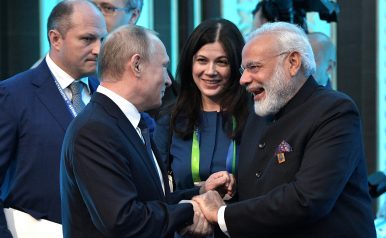By Aleksei Zakharov
 Four years since the Ukraine crisis and it is still hard to see the vivid contours of Russian foreign policy towards Asia writ-large and in specific regions. The conventional wisdom comes down to the fact that decision-making mechanisms in Russia are still focused on the West, namely the United States, EU and Russian interaction with them on various issues in different parts of the world. When it comes to Asia, there is much less political interest and some reluctant economic activity induced by Western sanctions.
Four years since the Ukraine crisis and it is still hard to see the vivid contours of Russian foreign policy towards Asia writ-large and in specific regions. The conventional wisdom comes down to the fact that decision-making mechanisms in Russia are still focused on the West, namely the United States, EU and Russian interaction with them on various issues in different parts of the world. When it comes to Asia, there is much less political interest and some reluctant economic activity induced by Western sanctions.
Almost two years ago, Russian President Vladimir Putin outlined the “Greater Eurasian Partnership,” which was established to reaffirm and broaden Moscow’s presence in the region by reaching out not only to the immediate neighborhood, but to China, ASEAN and India as well.
At the moment, it seems to be a case of “declarations first” and “implementation eventually.” Despite being promising, ambitious and geographically vast, this idea looks troublesome for Russia as its Asia policy is devoid of cohesive strategy and, to a large extent, disproportionately leans toward China.
There are at least three dilemmas visible for Russia’s near-term foreign policy in Asia.
The first and foremost challenge for Russia’s Asia policy is the need to balance between China and India, especially while the differences between the two are looming large. One of the elements of the “Greater Eurasia” project is an idea to align Russia’s Eurasia ambitions with the Chinese Belt and Road Initiative (BRI). A promising step in terms of Russia’s participation in regional integration mechanisms, however, may inadvertently turn into a wedge between Moscow and New Delhi. The latest meetings between the two states’ officials show that Moscow is trying to persuade New Delhi to reevaluate its stance over BRI and join the project, but these attempts simply lead to India’s silent rejection and allegations of Russia lobbying for Chinese interests. Under current geopolitical realities India would hardly ever come to terms with the Chinese-Pakistan Economic Corridor (CPEC) crossing the territory of Kashmir, albeit being part of it could be economically beneficial. Apart from BRI, almost every Russian move in Asia will require the assessment of the Beijing’s and New Delhi’s interests. Differences in those interests will lead to the making of hard decisions and subsequent dissatisfaction from one of the two.
Second, the Russian approach toward resolution of the Afghan crisis complicates matters. Dismissing media reports about interactions with the Taliban as “propaganda” and “speculations” does not lead to deeper understanding of Russian actions in the conflict. Russian officials are forced to explain Moscow’s opaque policy towards the Afghan crisis and answer uneasy questions about connections with the Taliban, Moscow’s vision of Pakistan’s role and competition with the United States.
Last, and for now, the least critical is the ongoing revival of the “Quad.” The quadrilateral format comprising India, Japan, the U.S. and Australia doesn’t pose any threat to Russian national security nor does it challenge Moscow’s regional interests – thanks to low Russian presence in the Indo-Pacific. Nevertheless, the development of this dialogue will definitely be observed closely by Moscow because of India’s active engagement. The more fruitful the Quad is, the more concern it will cause in Russia.
As the vast Indo-Pacific region has become a linchpin of global affairs, it requires Russian strategic thinking and serious (re)consideration of its regional policy. The gains of a transactional approach will not be long-lasting. The crises in Afghanistan and on the Korean peninsula, the dispute in South China Sea, and the rise of the competition in the Indian Ocean will present Russia with new dilemmas. Navigating through the web of strategic partners, regional partners and frenemies will be impossible without a coherent policy plan and comprehensive involvement in the region, both of which seem to be lacking for now.
Aleksei Zakharov is a research fellow at the Institute of Oriental Studies of the Russian Academy of Science. He writes on Indian foreign policy, Russia-India relations and international affairs in the Indo-Pacific. He tweets at @AlexisZakharov
No comments:
Post a Comment